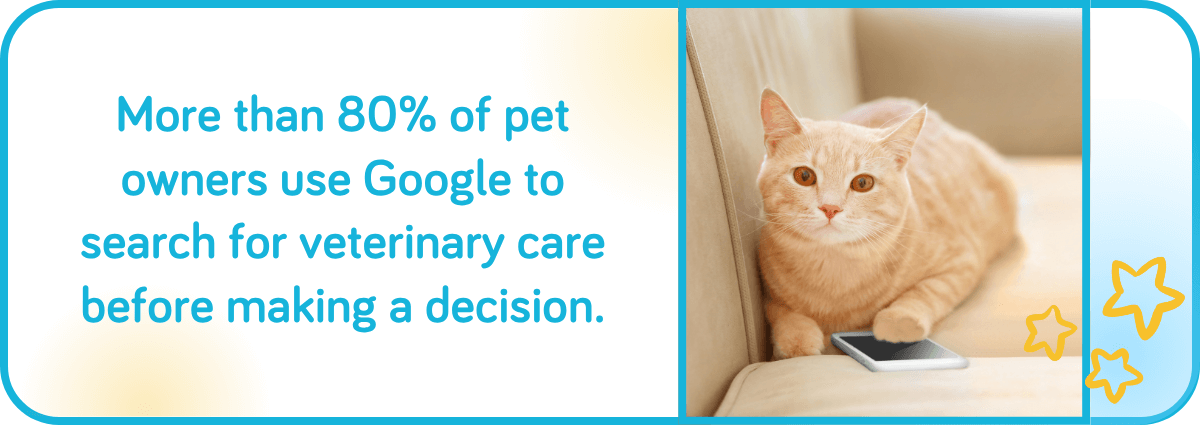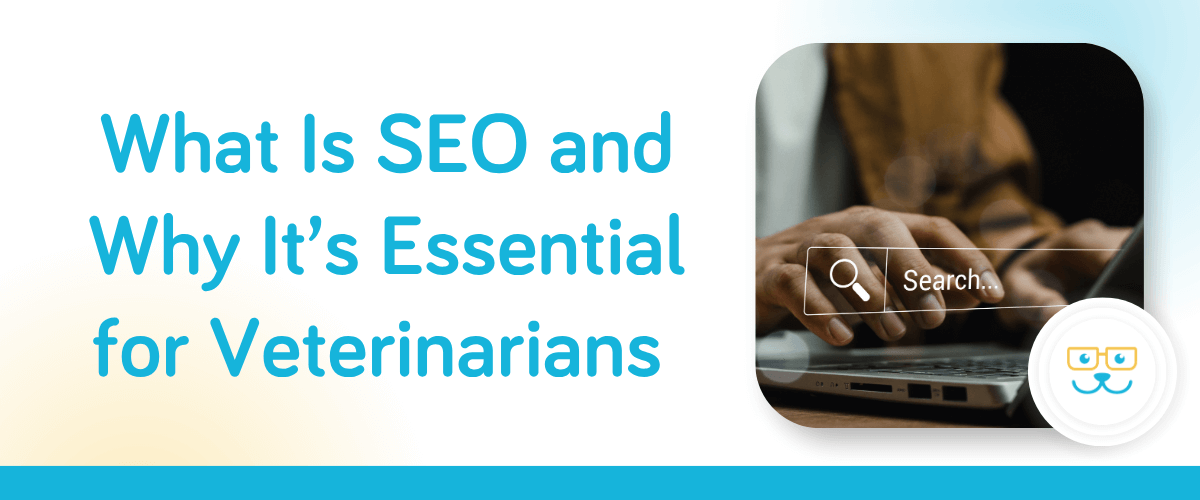What Is SEO and Why It’s Essential for Veterinarians
Most veterinarians didn't sign up to be marketers. You are trained to treat animals, not analyze website traffic. But in today's digital-first world, even the best DVMs can get overlooked if their online presence doesn't reflect the level of care they provide in person. That's where SEO comes in.
Search engine optimization helps your clinic show up when pet owners search online, whether for "veterinarian near me," "why is my dog throwing up," or "kitten vaccines in [your city]." These are high-intent searches; if your clinic isn't appearing, you're handing new clients to your competitors.
Let's examine SEO's real meaning, how it works for veterinary practices, and why it should be a core part of your growth strategy.
What Is SEO in Veterinary Terms?

Think of SEO as your clinic's curb appeal on Google. Just like you wouldn't leave your signage dirty or your lobby cluttered, you shouldn't let your website go unoptimized. SEO ensures that your practice rises to the top when someone searches for veterinary care or pet health questions in your area.
SEO involves a combination of tactics, including:
- Using the right keywords in your website content (like "emergency veterinary hospital in Denver" or "puppy vaccines [clinic name]")
- Creating valuable content that answers questions pet owners are Googling
- Making sure your site loads fast and works on mobile devices
- Optimizing your Google Business Profile
- Building online credibility with reviews and local listings
- Earning backlinks (other websites linking to your content)
This helps search engines understand who you are, what you do, and why your clinic is the best match for a local pet owner's search.
Why SEO Matters for Veterinary Clinics
You can't rely on referrals and foot traffic alone anymore. More than 80% of pet owners use Google to search for veterinary care before making a decision. If your clinic doesn't appear near the top of those search results, you're invisible to many potential clients.

1. SEO Drives the Right Traffic
Pet parents searching for specific services, like "spay and neuter near me" or "cat dental cleaning in Austin," are already motivated to act. SEO helps get your clinic in front of people who are ready to book, not just browse.
2. It's Cost-Effective
Unlike paid ads, SEO doesn't require you to spend every month to see results. While it does require effort and consistency, the traffic you generate from good SEO is free. Over time, SEO has become one of the highest-ROI marketing channels for veterinary clinics.
3. It Builds Trust
Appearing on the first page of Google is a credibility signal. Pet parents trust that the top results are legitimate, established, and recommended. If your competitor ranks higher, they're winning that trust by default, even if you're the better provider.
4. It Works 24/7
Your front desk might close at 6 p.m., but Google never sleeps. A well-optimized website is your best digital receptionist, always ready to answer questions, provide service details, and encourage bookings, even while you're off the clock.
How SEO Works in the Veterinary World
Let's use a simple example. A dog owner in Dallas needs to take their puppy in to be neutered, and types "dog neutering veterinarian Dallas" into Google. What determines which clinics show up?
Google uses hundreds of ranking factors, but key ones include:
- Does the clinic have a webpage or blog post that mentions "dog neutering" and "Dallas"?
- Is the clinic's Google Business Profile claimed and active?
- Does the site load quickly and work well on mobile?
- Are other local pet websites linking to this clinic?
- Are the contact details accurate and consistent across the web?
If your clinic nails those basics, you're far more likely to show up in the top results. And that means one thing: more clicks, more calls, and more clients.
Access the Veterinary SEO Checklist
Common SEO Misconceptions Among Veterinarians
- "My website is enough. I don't need SEO."
A website is the foundation, but without SEO, it's like building a hospital in the middle of a forest with no roads leading to it. - "We get good word-of-mouth referrals, so we're fine."
Referrals are fantastic, but even those people will Google you first. What will they find? - "SEO is too technical. I don't have time for that."
You don't need to become an SEO expert. You just need to prioritize it and partner with someone who understands both marketing and the veterinary world.

What Makes Veterinary SEO Unique?
Veterinary SEO isn't the same as general small business SEO. Your clients are emotionally invested in their pets and often search in moments of stress or urgency. You're not selling shoes, you're providing lifesaving, family-centered care.
Your SEO strategy needs to reflect that. That means:
- Using compassionate, educational content that reassures pet parents
- Focusing on localized terms like "emergency veterinary hospital near [area]" or "affordable vaccinations in [neighborhood]"
- Optimizing for voice search queries like "Where's the closest veterinary hospital open now?"
- Including information about species-specific care, preventative medicine, and pet wellness—not just services and pricing
- Adding helpful blogs about training, grooming frequency, pet behavior myths, and more
A veterinary SEO strategy should be tailored to your services, your team's personality, and your community's needs.
Ready to Make SEO Work for Your Practice?
If you've made it this far, you already understand: SEO isn't optional. It's essential. And it's not just about algorithms, it's about being there for the pet parent who's panicking at midnight, the new puppy owner looking for their first veterinarian, or the senior cat mom searching for someone she can trust. SEO helps you show up in those exact moments before your competition does.
Want to see how your site stacks up and what opportunities you might be missing? Book a free Marketing Health Exam with our team of experts. We'll walk you through your current SEO performance and show you how to turn your online presence into a client-generating machine.
Let’s ensure the best local veterinarian (that's you) isn't buried on page two.
Book Your Complimentary Marketing Health Exam
Want more tips like this every week?
Subscribe to the GeniusVets Weekly Newsletter and get fresh insights, free resources, and veterinary marketing strategies delivered straight to your inbox.

